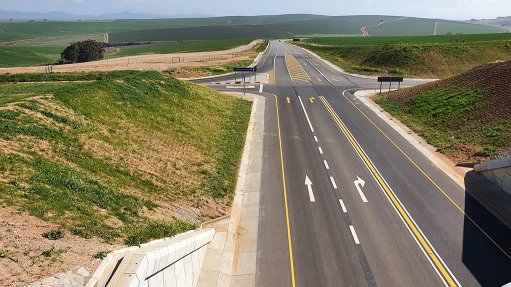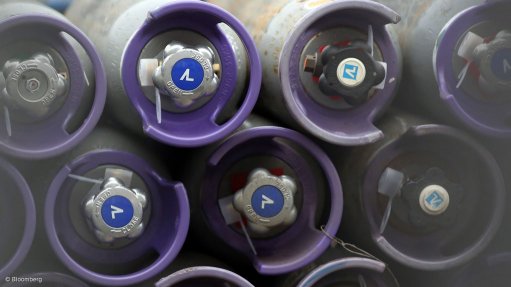Africa gains global recognition for world-class projects
This article has been supplied as a media statement and is not written by Creamer Media. It may be available only for a limited time on this website.
Company Announcem,ent - KPMG International’s Infrastructure 100: World Markets Report, highlights key trends driving infrastructure investment around the world. A global panel of industry experts identifies 100 of the world’s most innovative, impactful infrastructure projects showing how governments are coming together with the private sector to overcome funding constraints to finance and build projects that can improve quality of life – both solving immediate needs and planning for future societal demands. The report looks at infrastructure based on the dynamics of four key markets: Mature International Markets (like Canada, Australia, and UK), Economic Powerhouses (including the US and BRIC countries), Smaller Established Markets (like Chile, Sweden, New Zealand, Korea and South Africa), and Emerging Markets (including a number of economies in Africa). The panel of independent industry experts evaluated over 400 diverse and compelling projects to ultimately select the final 100, based on:
Scale – How does the scale of the project relate to similar developments in its class?
Feasibility – Is the project plan feasible and sustainable?
Complexity – How challenging or complex is it to get stakeholder support?
Innovation – Is there a particular challenge the project overcomes?
Impact on society – Does it improve quality of life or promote economic growth?
With a total estimated value of over US$1.73 trillion, the 100 projects illustrate a range of infrastructure investment, some with a potentially transformative impact that could change the face of nations. Many of the projects are designed to drive economic growth by connecting people and resources to global and local markets (40% of projects featured); others will help provide better access to reliable power and clean water (30% of projects); while others are focused on improving society through things like healthcare and education. Noteworthy is that eleven of the 100 projects showcased in this report are in Africa, which is up from the six African projects that featured in the previous report – a testament to the rate of development of world class projects on the continent. De Buys Scott, Head of Infrastructure Advisory: Global Infrastructure Major Projects, says, “The fact that twelve percent of the projects represented in this report are in Africa is a clear indication that the continent is attracting more interest, which is leading to significant and long-term investment and, subsequently more sustainable development – as each of the eleven African projects will play a crucial role in long-term socioeconomic growth on the continent.”
Meeting the funding challenge
However, the Infrastructure 100 also brings to light affordability concerns and the need for governments to make difficult choices about where to spend with funding in short supply. Balancing the aspirations of a nation with the need for true social benefit is not an easy challenge.
“Each country has its own approach to developing and funding infrastructure, yet all share the universal challenge of creating the right conditions to attract investment so desperately needed,” says James Stewart, KPMG’s Chairman of Global Infrastructure. “Private capital continues to play a critical role, but investors need economic and political stability before committing. Consistency and sustainability are the keys, in setting policy, the right regulatory environment and establishing a steady deal flow through project pipelines.”
Scott further adds, “In reality and due to historic underdevelopment on the continent, unfortunately there will always be a funding gap in Africa. The long-term opportunity and the aim, however, should be to shrink the gap and, this will only be achieved through more projects. Demonstrating the world that it is possible to do these major projects on the continent – and having a proven track record of successful projects - is the strongest source of motivation to entice further investment and/or access to funding and, will significantly contribute to closing the gap. This is why collaboration between public and private sector and the funding/investor communities – particularly around joint ventures or public-private-partnership opportunities - is so critical to unlocking the continent’s growth potential.
Attracting private investment
The report illustrates the critical role of private investment in meeting the infrastructure challenge, with different investment dynamics in each market category. For instance, that smaller established markets such as South Africa, tend to favour domestic financing, with international financiers restricted by the lack of major projects, competitive local capital and currency risk. However, the report notes an increasing need for these markets to consider collaborative, cross-border infrastructure projects that deliver regional economic growth and bring the scale of major projects that international investors are seeking.
“The North-South Africa Corridor (in SADC) between Zambia and South Africa is an excellent example of this, as although projects around this Corridor are still being conceptualised and developed, once this Corridor comes into being it will be a major player in facilitating export trade within Southern Africa, in terms of promoting proficient movement of goods and services,” indicates Scott.
On the other hand however, Emerging markets represent a frontier for private finance in infrastructure. Although in some emerging economies a lack of funds, inadequate planning, and unstable political environments have limited the availability of projects that could attract private money.
Comments
Press Office
Announcements
What's On
Subscribe to improve your user experience...
Option 1 (equivalent of R125 a month):
Receive a weekly copy of Creamer Media's Engineering News & Mining Weekly magazine
(print copy for those in South Africa and e-magazine for those outside of South Africa)
Receive daily email newsletters
Access to full search results
Access archive of magazine back copies
Access to Projects in Progress
Access to ONE Research Report of your choice in PDF format
Option 2 (equivalent of R375 a month):
All benefits from Option 1
PLUS
Access to Creamer Media's Research Channel Africa for ALL Research Reports, in PDF format, on various industrial and mining sectors
including Electricity; Water; Energy Transition; Hydrogen; Roads, Rail and Ports; Coal; Gold; Platinum; Battery Metals; etc.
Already a subscriber?
Forgotten your password?
Receive weekly copy of Creamer Media's Engineering News & Mining Weekly magazine (print copy for those in South Africa and e-magazine for those outside of South Africa)
➕
Recieve daily email newsletters
➕
Access to full search results
➕
Access archive of magazine back copies
➕
Access to Projects in Progress
➕
Access to ONE Research Report of your choice in PDF format
RESEARCH CHANNEL AFRICA
R4500 (equivalent of R375 a month)
SUBSCRIBEAll benefits from Option 1
➕
Access to Creamer Media's Research Channel Africa for ALL Research Reports on various industrial and mining sectors, in PDF format, including on:
Electricity
➕
Water
➕
Energy Transition
➕
Hydrogen
➕
Roads, Rail and Ports
➕
Coal
➕
Gold
➕
Platinum
➕
Battery Metals
➕
etc.
Receive all benefits from Option 1 or Option 2 delivered to numerous people at your company
➕
Multiple User names and Passwords for simultaneous log-ins
➕
Intranet integration access to all in your organisation


















